
From Wheat To Oil & Gas – How Russia Invasion Of Ukraine Affects Europe’s Food Supply, And Even Your Loaf Of Bread
Putin might be a mad dictator to the Western countries, but he is not crazy, let alone stupid. On the contrary, he could be smarter than the U.S. and NATO, based on his political chess game so far. He tactically recognized the independence of two self-proclaimed and pro-Russian republics in eastern Ukraine, before sending troops and tanks under the guise of “peacekeepers”.
While the U.S. and Europe were scratching their head, wondering if such manoeuvre should be called an invasion or not, Putin was already two steps ahead. Taking a page from the U.S. favourite playbook, the Russian supremo ordered a “special military operation” (which was actually an invasion) and subsequently “surgical strikes” (attacks) against Ukraine military infrastructure.
The terms “peacekeepers”, “special military operation” and “surgical strikes” have been used by the West to create an innocent perspective, as if they were non-destructive military invasions against foreign countries that threatened their national interests. So, Vladimir Putin is learning how to use similar marketing gimmicks to destroy the pro-Western Ukrainian government.
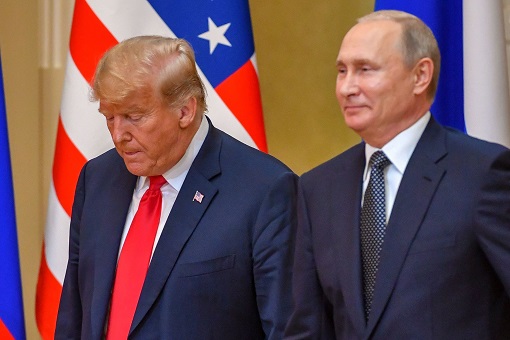
Even Donald Trump has praised Putin as a genius over his decision to declare breakaway regions in Ukraine as independent before swiftly moved troops and tanks to secure the territories. Of course, Trump was meant to mock and insult political rival Joe Biden, who only knows how to issue warnings for weeks about sanctions on Russia. Do you think Putin gives a shit about sanctions?
The endgame of Putin is not to burn Ukraine to the ground, but to install a pro-Russian regime. He was not interested to kill all the people of Ukraine. That’s why the surgical strikes to destroy and cripple Ukrainian command centres, navy post, radars, air defence systems, airfields and other military installations. He could, but did not destroy cities in order to avoid casualties.
Heck, Putin has even repeatedly described as “genocide” committed by nationalist Ukrainian government against “Russian people” in Donetsk and Lugansk regions. Did not the U.S. also like to use “genocide” to justify their military invasions or operations in Iraq, for example? President Joe Biden has called Chinese President Xi Jinping a “thug” and labelled the Xinjiang issue as “genocide”.
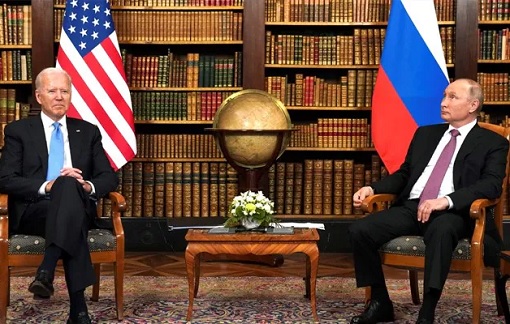
The Russian leader had made his own calculations before decided on the invasion of Ukraine. He knew neither the U.S. nor NATO has the balls to intervene militarily. If the military superpower did not even dare to attack North Korea, chances were they would not dare declare a war with Russia. The most the West can do was to impose more economic sanctions.
But thanks to Washington’s arrogance in picking a fight with Beijing, the Kremlin can now depend on China following Xi Jinping’s pledge with Vladimir Putin on February 4 that there would be “no ‘forbidden’ areas of cooperation” in their bilateral relationship. China is ready to throw Russia an economic lifeline after the U.S. and European Union slapped new sanctions on Moscow.
In truth, the U.S. has imposed more than 100 sanctions on Russia since 2011. And obviously, those sanctions have failed to solve any problem, let alone bring Moscow down to its knees. In the same breath, the Ukraine issue cannot be resolved with the U.S.’ new sanctions on Russia. Likewise, Europe will not be any safer with new sanctions on Russia.
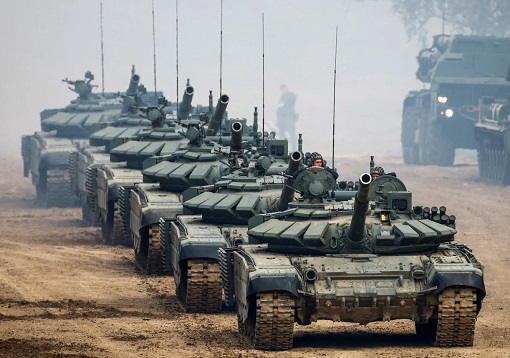
On the contrary, the sanctions would not only make the region more hostile and unstable, but also would wreck havoc the Europe – even the global – economy. Let’s forget about the stock markets, which have already crashed even before the Ukraine invasion. Oil and gas prices are already skyrocketing as the crisis escalates. Oil prices have shot to US$100 a barrel.
In case President Biden hadn’t a clue, Russia is a major exporter of crude oil, accounting for about 12% of the world’s supply. When push comes to shove, Putin could retaliate by stopping oil and natural gas exports. That would put pressure on gasoline and natural gas prices not only in the U.S., but also the European Union and even the world, worsening the inflation, which the U.S. is trying to tackle.
Make not mistake. If Russia’s economy is going down, it’s not rocket science that Putin is going to take the global economy with it. America’s Strategic Petroleum Reserve will not be sufficient to handle the shortage in long term. In fact, any news that the U.S. will release its oil reserve will only trigger panic and push the oil prices even higher, which will again feed the flame of inflation.
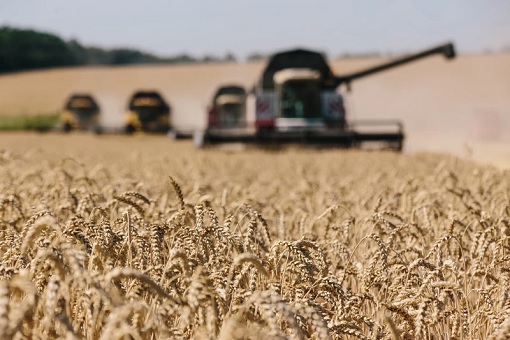
Ukraine alone could and would create a food supply nightmare to Europe. Both Russia and Ukraine are huge producers of agricultural products like wheat, barley, grains and rye that are badly needed by Europe. Ukraine is the fifth largest exporter of wheat – 7% of global sales. Because 71% of its land is agricultural, Ukraine is considered the “breadbasket” of Europe.
While Russia is the world’s biggest exporter of wheat (18% of global exports), Ukraine is the biggest exporter of seed oils. As the Black Sea is under Russian’s control now, 95% of Ukraine’s wheat cannot be exported, creating a global shortage. Combined, Russia and Ukraine exported more than a quarter (25.4%) of the world’s wheat, ingredient to make bread, noodles, pastries and cereal.
Sunflower oil is the world’s third most traded vegetable oil after palm and soybean oil. And Ukraine and Russia accounts for 46.9% and 29.9% respectively of global exports of sunflower oil. On top of that, Ukraine is also a huge exporter of corn. But European countries are not the only one that would be affected. Middle East and Africa also rely on Ukraine’s wheat and corn.
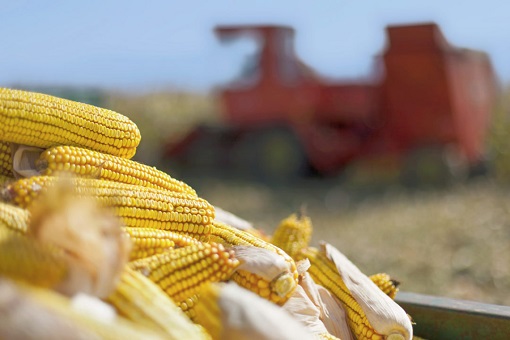
About 16% of global corn exports comes from Ukraine. So, together, Russia and Ukraine supply more than 25% of global wheat exports, 80% of sunflower oil exports and almost 20% of corn exports. That explains why the U.S. wheat, corn and soybean prices, which were already hitting the roof, skyrocketed on Thursday (Feb 24) after Russia launched an invasion of Ukraine.
Half of Ukraine’s corn goes to Europe, where they are used in animal feed as well as biofuel. Even China would get hit as it imports about a third of Ukraine’s corn to feed the world’s largest hog herd. The disruption to shipments of corn would force Chinese hog producers to search for alternative sources, which in turn would push up the price of the commodity.
To make matters worse, fertilizers, which were already in short supply last year, would see its price soars because Russia is the top producer. On Feb 2, before the invasion, Russia banned the export of ammonium nitrate to ensure affordable supplies for domestic farmers. Russia exports two-thirds of the world’s ammonium nitrate, which is used in fertilizers to improve yields for crops like wheat, corn and cotton.
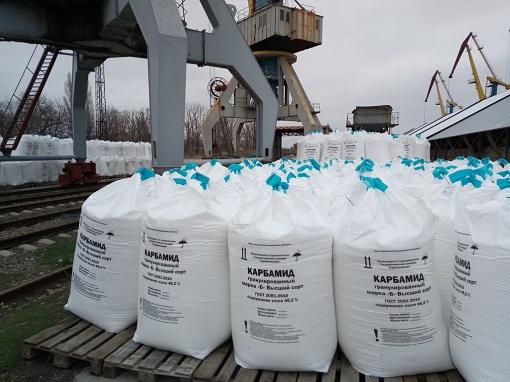
While grocery stores in the U.S. could see price hike, the food industry, especially in Europe and the United Kingdom, will also be hit by rising energy prices that saw crude oil hitting US$100 a barrel. Natural gas is the main ingredient of fertilizer. Therefore, farmers who could not afford the increase in costs of fertilizers will see lower crop production, which in turn will hit global food security.
Guess what, Russia is one of the biggest oil and gas producers in the world. The best part is Ukraine is a critical route for oil that flows into Eastern Europe and subsequently to all the European Union countries. Like it or not, Russia’s attack on Ukraine is not only about oil and gas, but also the entire supply chain of other commodities that threaten global food prices.
In addition, Russia also controls about 10% of global copper reserves, and is a major producer of nickel and platinum. While copper is an essential metal used in electronics manufacturing and construction of homes, nickel is a key raw material used in electric vehicle batteries. The U.S. chip industry actually relies heavily on Ukrainian-sourced neon and palladium.
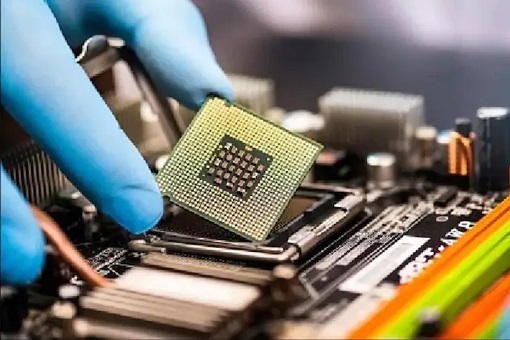
Just before the invasion, Technet, a market research group, has warned the White House that the U.S. is not the only one holding all the trump cards. Putin could hit the U.S. chip industry by blocking access to key materials as 90% of American semiconductor-grade neon supplies come from Ukraine, while 35% of U.S. palladium (used in sensors and memory) is sourced from Russia.
Clearly, Putin hadn’t lost any sleep over Biden’s repetitive threats to sanction Russia if Moscow invades Ukraine. Russia has its own trump cards. The fact that the supremo appears to suggest that nuclear weapons could be used against the U.S. or NATO if they interfere in the Ukraine invasion speaks volumes about how effective are the Western’s sanctions.
While the U.S. and Europe were scratching their head, wondering if such manoeuvre should be called an invasion or not, Putin was already two steps ahead. Taking a page from the U.S. favourite playbook, the Russian supremo ordered a “special military operation” (which was actually an invasion) and subsequently “surgical strikes” (attacks) against Ukraine military infrastructure.
The terms “peacekeepers”, “special military operation” and “surgical strikes” have been used by the West to create an innocent perspective, as if they were non-destructive military invasions against foreign countries that threatened their national interests. So, Vladimir Putin is learning how to use similar marketing gimmicks to destroy the pro-Western Ukrainian government.

Even Donald Trump has praised Putin as a genius over his decision to declare breakaway regions in Ukraine as independent before swiftly moved troops and tanks to secure the territories. Of course, Trump was meant to mock and insult political rival Joe Biden, who only knows how to issue warnings for weeks about sanctions on Russia. Do you think Putin gives a shit about sanctions?
The endgame of Putin is not to burn Ukraine to the ground, but to install a pro-Russian regime. He was not interested to kill all the people of Ukraine. That’s why the surgical strikes to destroy and cripple Ukrainian command centres, navy post, radars, air defence systems, airfields and other military installations. He could, but did not destroy cities in order to avoid casualties.
Heck, Putin has even repeatedly described as “genocide” committed by nationalist Ukrainian government against “Russian people” in Donetsk and Lugansk regions. Did not the U.S. also like to use “genocide” to justify their military invasions or operations in Iraq, for example? President Joe Biden has called Chinese President Xi Jinping a “thug” and labelled the Xinjiang issue as “genocide”.

The Russian leader had made his own calculations before decided on the invasion of Ukraine. He knew neither the U.S. nor NATO has the balls to intervene militarily. If the military superpower did not even dare to attack North Korea, chances were they would not dare declare a war with Russia. The most the West can do was to impose more economic sanctions.
But thanks to Washington’s arrogance in picking a fight with Beijing, the Kremlin can now depend on China following Xi Jinping’s pledge with Vladimir Putin on February 4 that there would be “no ‘forbidden’ areas of cooperation” in their bilateral relationship. China is ready to throw Russia an economic lifeline after the U.S. and European Union slapped new sanctions on Moscow.
In truth, the U.S. has imposed more than 100 sanctions on Russia since 2011. And obviously, those sanctions have failed to solve any problem, let alone bring Moscow down to its knees. In the same breath, the Ukraine issue cannot be resolved with the U.S.’ new sanctions on Russia. Likewise, Europe will not be any safer with new sanctions on Russia.

On the contrary, the sanctions would not only make the region more hostile and unstable, but also would wreck havoc the Europe – even the global – economy. Let’s forget about the stock markets, which have already crashed even before the Ukraine invasion. Oil and gas prices are already skyrocketing as the crisis escalates. Oil prices have shot to US$100 a barrel.
In case President Biden hadn’t a clue, Russia is a major exporter of crude oil, accounting for about 12% of the world’s supply. When push comes to shove, Putin could retaliate by stopping oil and natural gas exports. That would put pressure on gasoline and natural gas prices not only in the U.S., but also the European Union and even the world, worsening the inflation, which the U.S. is trying to tackle.
Make not mistake. If Russia’s economy is going down, it’s not rocket science that Putin is going to take the global economy with it. America’s Strategic Petroleum Reserve will not be sufficient to handle the shortage in long term. In fact, any news that the U.S. will release its oil reserve will only trigger panic and push the oil prices even higher, which will again feed the flame of inflation.

Ukraine alone could and would create a food supply nightmare to Europe. Both Russia and Ukraine are huge producers of agricultural products like wheat, barley, grains and rye that are badly needed by Europe. Ukraine is the fifth largest exporter of wheat – 7% of global sales. Because 71% of its land is agricultural, Ukraine is considered the “breadbasket” of Europe.
While Russia is the world’s biggest exporter of wheat (18% of global exports), Ukraine is the biggest exporter of seed oils. As the Black Sea is under Russian’s control now, 95% of Ukraine’s wheat cannot be exported, creating a global shortage. Combined, Russia and Ukraine exported more than a quarter (25.4%) of the world’s wheat, ingredient to make bread, noodles, pastries and cereal.
Sunflower oil is the world’s third most traded vegetable oil after palm and soybean oil. And Ukraine and Russia accounts for 46.9% and 29.9% respectively of global exports of sunflower oil. On top of that, Ukraine is also a huge exporter of corn. But European countries are not the only one that would be affected. Middle East and Africa also rely on Ukraine’s wheat and corn.

About 16% of global corn exports comes from Ukraine. So, together, Russia and Ukraine supply more than 25% of global wheat exports, 80% of sunflower oil exports and almost 20% of corn exports. That explains why the U.S. wheat, corn and soybean prices, which were already hitting the roof, skyrocketed on Thursday (Feb 24) after Russia launched an invasion of Ukraine.
Half of Ukraine’s corn goes to Europe, where they are used in animal feed as well as biofuel. Even China would get hit as it imports about a third of Ukraine’s corn to feed the world’s largest hog herd. The disruption to shipments of corn would force Chinese hog producers to search for alternative sources, which in turn would push up the price of the commodity.
To make matters worse, fertilizers, which were already in short supply last year, would see its price soars because Russia is the top producer. On Feb 2, before the invasion, Russia banned the export of ammonium nitrate to ensure affordable supplies for domestic farmers. Russia exports two-thirds of the world’s ammonium nitrate, which is used in fertilizers to improve yields for crops like wheat, corn and cotton.

While grocery stores in the U.S. could see price hike, the food industry, especially in Europe and the United Kingdom, will also be hit by rising energy prices that saw crude oil hitting US$100 a barrel. Natural gas is the main ingredient of fertilizer. Therefore, farmers who could not afford the increase in costs of fertilizers will see lower crop production, which in turn will hit global food security.
Guess what, Russia is one of the biggest oil and gas producers in the world. The best part is Ukraine is a critical route for oil that flows into Eastern Europe and subsequently to all the European Union countries. Like it or not, Russia’s attack on Ukraine is not only about oil and gas, but also the entire supply chain of other commodities that threaten global food prices.
In addition, Russia also controls about 10% of global copper reserves, and is a major producer of nickel and platinum. While copper is an essential metal used in electronics manufacturing and construction of homes, nickel is a key raw material used in electric vehicle batteries. The U.S. chip industry actually relies heavily on Ukrainian-sourced neon and palladium.
Just before the invasion, Technet, a market research group, has warned the White House that the U.S. is not the only one holding all the trump cards. Putin could hit the U.S. chip industry by blocking access to key materials as 90% of American semiconductor-grade neon supplies come from Ukraine, while 35% of U.S. palladium (used in sensors and memory) is sourced from Russia.
Clearly, Putin hadn’t lost any sleep over Biden’s repetitive threats to sanction Russia if Moscow invades Ukraine. Russia has its own trump cards. The fact that the supremo appears to suggest that nuclear weapons could be used against the U.S. or NATO if they interfere in the Ukraine invasion speaks volumes about how effective are the Western’s sanctions.

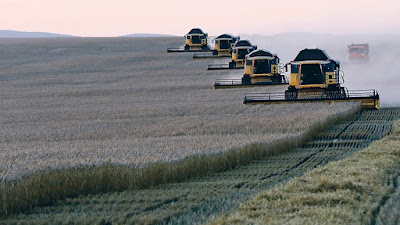


Guess what, USA is THE biggest oil producer in the world...
ReplyDeleteIsn't this the same Twit-for-Twat who last week lambasted the Wankees for inventing the accusation that Russia was preparing to invade Ukraine ?
ReplyDeleteWhat a Russian lampa polisher.
Wakakakaka…
ReplyDeleteAin't u the mfer who keeps its faith on the success of US/Western sanctions on Russia?
US shale oil production pushes it to the top 3 oil producers of the world. But shale oil has industrial application limitations. It's NOT a 100% replacement for natural crude oil!
Besides, most of the US oil production is only enough for its vehicular consumption!
But, how do u know?
Oooop… wait till the US CPI hits 10% in 1Q2020 only then u fart!
Correction 1Q2022
DeleteIf you read and watch only those Western MSM, one would think that thousands of Russian soldiers are going back in body bags and that Putin will fail big time, unable to see his way to a successful end-game.
ReplyDeleteWatch Scott Ritter, the weapons inspector who went to Iraq and came back and said " There Is NO WMD " and yet the very next week, Colin Powell was waving a tube of washing detergent and the rest is history, with 500,000 Iraqi children starved to death and that the " price is worth it", but who paid the price ? certainly not by these murderers.
"NATO too weak to face Russia"....never knew Scott Ritter is such a riveting personality and he didn't mince his words
https://youtu.be/3GkmdCaBECs